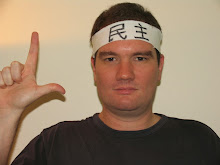2011-07-10
Self-defence
There is something inherently wrong with self-defence. While it is indeed a right, the problem is that the victim only gets justice if they are strong enough to defend themselves and win the fight with the aggressor. Therefore as a civilization we need to ensure that no individual or country ever needs to defend themselves. That even if a victim does nothing, the collective will react to the violation and bring justice.
If the world was only comprised of innocent liberal democracies, then the UN would be an appropriate body to defend the rights of the individual country. This has a direct analogy in the playground where a bully may victimize an innocent person and a stronger force is called upon to hopefully bring justice.
I deal with these analogies a lot. Individual countries are just groups rather than individuals and you can usually draw a conclusion about how a collection of countries behave and then apply those rules to individuals within a country. Or vice-versa.
I believe the reason people are drawing different conclusions is that they look at countries as a complete entity with the head of state as its legitimate representative. But I instead see a dictator as representing only 5% or whatever as the population, and treat that as an entity, and treat the other 95% as a different entity, and the one that is the victim of oppression. In a democracy you have 51% who voted for the leader, with most of the other 49% supporting the legitimacy of that leader's rule and strongly opposed to any attack upon him.
|
If the world was only comprised of innocent liberal democracies, then the UN would be an appropriate body to defend the rights of the individual country. This has a direct analogy in the playground where a bully may victimize an innocent person and a stronger force is called upon to hopefully bring justice.
I deal with these analogies a lot. Individual countries are just groups rather than individuals and you can usually draw a conclusion about how a collection of countries behave and then apply those rules to individuals within a country. Or vice-versa.
I believe the reason people are drawing different conclusions is that they look at countries as a complete entity with the head of state as its legitimate representative. But I instead see a dictator as representing only 5% or whatever as the population, and treat that as an entity, and treat the other 95% as a different entity, and the one that is the victim of oppression. In a democracy you have 51% who voted for the leader, with most of the other 49% supporting the legitimacy of that leader's rule and strongly opposed to any attack upon him.
